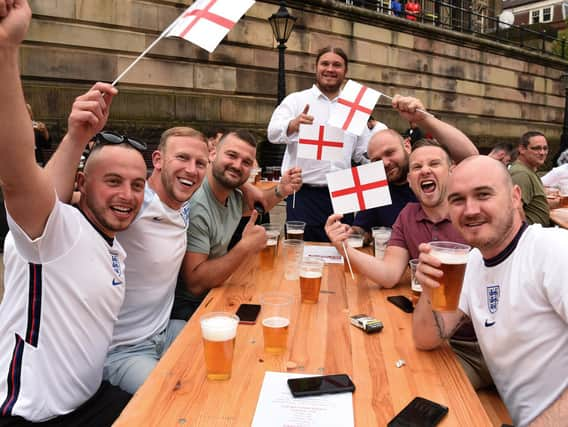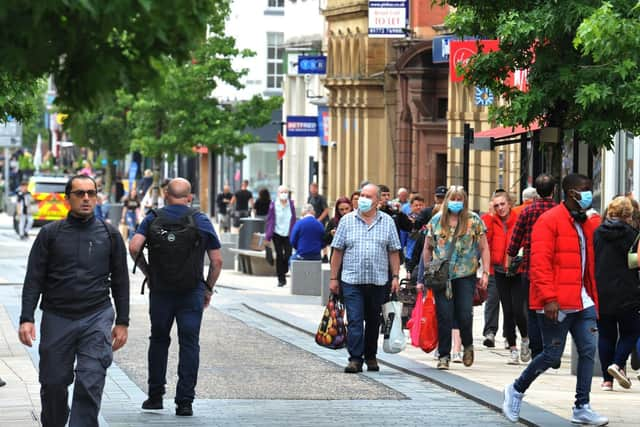England's run in Euros helps to kick-start Preston's recovery


Across the UK, retailers saw sales rebound as football fans enjoying the Euros bought more food and drink.
The Office for National Statistics revealed that retail sales volumes increased by 0.5 per cent in June.
Advertisement
Hide AdAdvertisement
Hide AdAnd it is hoped that the relaxing of all Government coronavirus restrictions on July 19 will have boosted the economies of Lancashire’s towns and cities even further.


New figures show that shops, restaurants and entertainment venues in Preston saw a boost in visitors following the reopening of indoor hospitality in May – but footfall remained below levels before the Covid pandemic.
However, England’s run all the way to the final in the Euros and the runaway success of the Fan Zone on Preston’s Flag Market showing every England match kick-started the local economy after months of stop-start trading.
The Fan Zone helped to bring people into the city centre, with many bars and restaurants joining in the fun to cater for the overflow.
Advertisement
Hide AdAdvertisement
Hide AdGeoff Mason, policy manager for the Preston-based North&Western Lancashire Chamber of Commerce, said: “It is encouraging to see retail figures return to growth.
“This remains a difficult time for many despite re-opening and consistent growth in sales needs to be seen to help many businesses rebuild after the troubles of the past year.
“Continued growth needs to be maintained without relying on one off events such as the Euros.”
A spokesman for Preston City Centre Business Improvement District, said: “We’re very grateful that people have returned to the city centre, in a safe way, to enjoy themselves responsibly and support our brilliant local businesses.”
Advertisement
Hide AdAdvertisement
Hide AdPaul Butcher, who runs the city centre Stanley Arms in Preston, said the Euros and the Fan Zone had been boost.
He said: “Recently trade has been pretty good. Obviously we have had to work within the restrictions, but things have changed and England playing so many matches in the Euros has been a huge help.
“Let’s hope we can keep going and stay open without going back into an endless cycle of restrictions.”
Preston’s May data comes from Google which uses location data from phones and other personal devices to track trends in people’s movement in different parts of their daily lives.
Advertisement
Hide AdAdvertisement
Hide AdIt compares footfall in areas where there is retail and recreation such as restaurants, cafes and shopping centres to a five week-baseline period recorded before the Covid-19 crisis.
The figures showed that in Preston, average activity across these areas was 18 per cent below normal levels across the two weekends – May 8-9 and May 15-16 – prior to the lifting of restrictions on indoor hospitality on May 17.
On the Saturday and Sunday of the Spring Bank Holiday on May 31, increased activity meant it was one per cent below normal levels.
Then across the final two weekends with data – July 3-4 and July 10-11 – footfall fell to nine per cent below pre-pandemic levels.
Advertisement
Hide AdAdvertisement
Hide AdAcross the UK, average activity in retail and recreation areas increased from 35 per cent below the baseline over the weekends of May 8-9 and May 15-16, to 18 per cent below across July 2-3 and July 12-13.
The weekend of the Spring Bank Holiday saw a peak in visitors with activity just 11 per cent down on pre-pandemic levels.
The figures will have been impacted by the easing of Covid restrictions across England on May 17, which allowed restaurants and pubs to open indoor areas for food and drink.
Cinemas, hotels and children’s play areas were also given the go-ahead to reopen, along with indoor sporting and entertainment venues.
Advertisement
Hide AdAdvertisement
Hide AdThe British Retail Consortium said better weather in June and the success of Euro 2020 had also helped boost trade, with the body reporting a growth in High Street sales between April and June.
Meanwhile, Paul Martin, UK head of retail at KPMG, said the reopening of hospitality and leisure sectors had led to a “dilution” in consumer spending, although he said businesses now faced greater competition from online retailers.
He added: “Retailers will be hoping that the feel-good factor from Euro 2020 and lifting of COVID-19 restrictions will give the high street the summer boost it needs.”